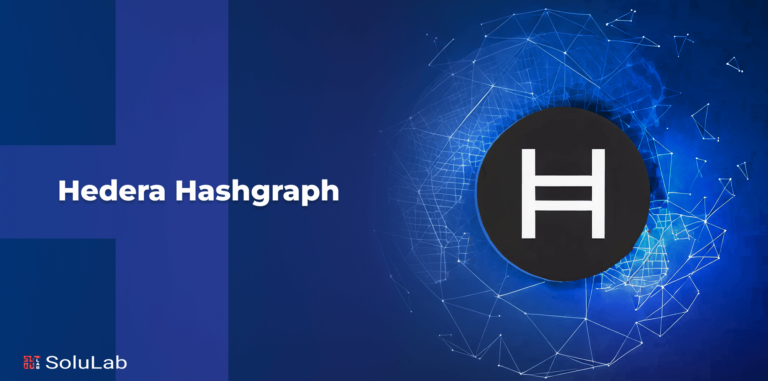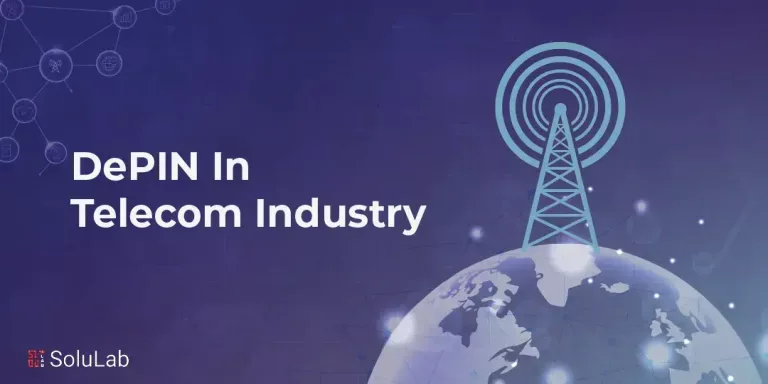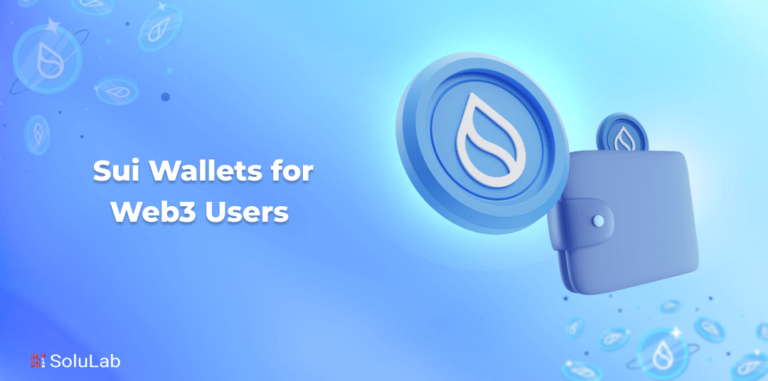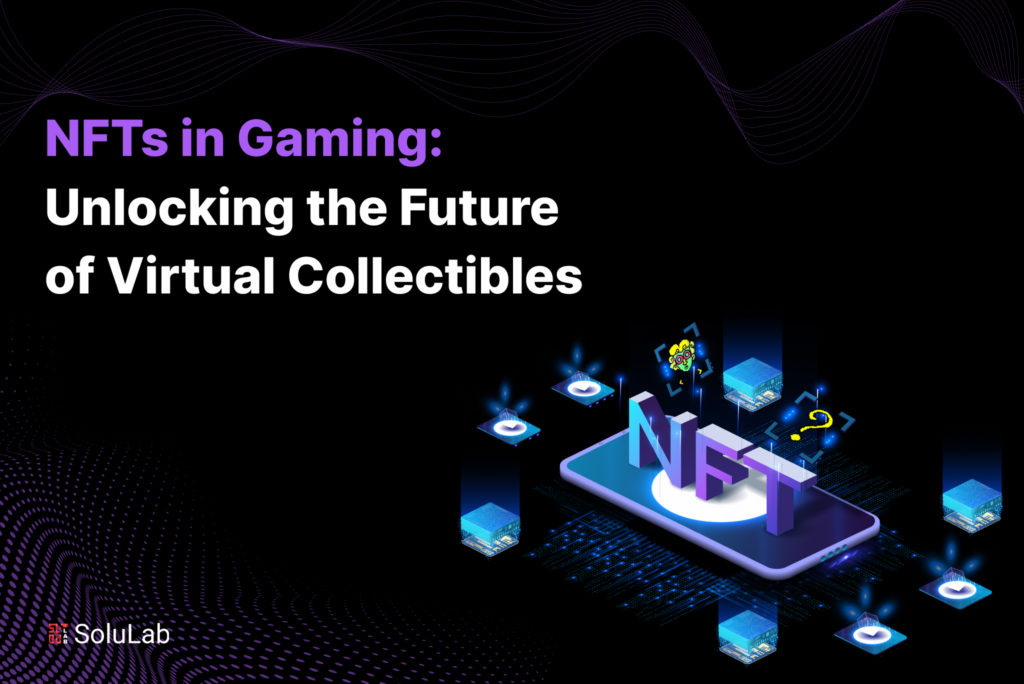
In recent years, the convergence of blockchain technology and the gaming industry has given rise to a transformative trend – Non-Fungible Tokens (NFTs) in gaming. This introduction will provide a brief overview of NFTs in gaming, delve into the essence of non-fungible tokens, highlight the significance of NFT gaming collectibles, and elucidate the purpose of the outlined discussion.
Non-Fungible Tokens, or NFTs, are cryptographic tokens built on blockchain technology, typically utilizing Ethereum’s ERC-721 or ERC-1155 standards. Each NFT possesses a distinct set of properties that differentiate it from other tokens. These properties could include metadata, ownership history, and rarity factors. NFTs have gained widespread attention and adoption not only in gaming but also in art, entertainment, and various digital ecosystems due to their ability to represent ownership and uniqueness in the digital realm.
The significance of NFT gaming collectibles lies in their capacity to revolutionize the gaming experience. These digital assets empower gamers with true ownership of in-game items and characters, granting them the freedom to buy, sell, or trade these assets across different gaming platforms. This new paradigm disrupts the traditional closed-loop system of gaming, where virtual items are typically owned by game developers and publishers, allowing gamers to derive real-world value from their in-game investments.
Read Our Blog Post: Top NFT Development Companies To Look At In 2024
What are NFTs in Gaming?
Non-fungible tokens (NFTs) have emerged as a revolutionary concept in the world of digital assets and gaming. To grasp their significance within the gaming sphere, it’s essential to delve into what NFTs are and how they have been seamlessly integrated into video games.
NFTs, or Non-Fungible Tokens, are unique digital assets that are indivisible, irreplaceable, and provably scarce. Unlike cryptocurrencies like Bitcoin or Ethereum, which are fungible and interchangeable, NFTs represent ownership of one-of-a-kind items, such as digital art, collectibles, or in-game assets. Each NFT is distinguished by a distinct token ID and is stored on a blockchain, ensuring its authenticity and ownership history.
NFTs have found a natural home in the gaming world, where virtual collectibles and in-game items have long held significant value for players. Game developers have begun leveraging NFT technology to create unique in-game assets and collectibles that players can buy, sell, and trade. These NFT gaming collectibles are often tied to blockchain technology, allowing players to truly own and control their virtual possessions. This integration has opened up exciting possibilities for both gamers and developers.
What Role Do NFT Gaming Collectibles Play in Shaping the Economies?
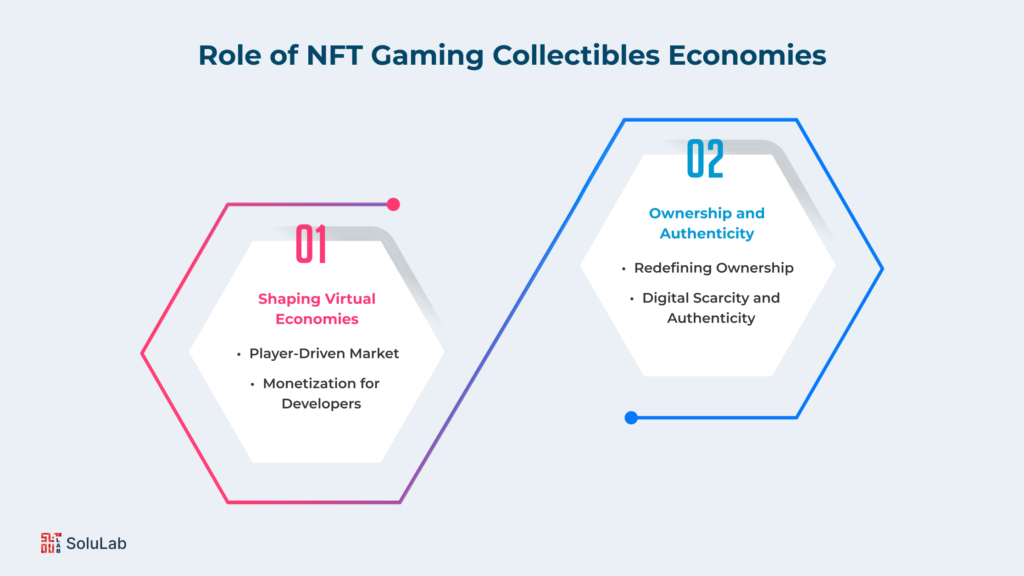
NFT gaming collectibles are distinct digital items within video games, each represented as a unique NFT on a blockchain. Unlike traditional in-game assets that are often confined to specific game ecosystems, NFTs offer true ownership and portability. Players can buy, sell, and trade these collectibles both within and outside the game environment, with ownership records securely recorded on the blockchain. This creates a sense of ownership that transcends the boundaries of individual games, making NFT gaming collectibles highly coveted.
1. Shaping Virtual Economies:
-
Player-Driven Market
NFT gaming collectibles have introduced a player-driven market within virtual gaming worlds. These assets are not just cosmetic; they hold real-world value. This economic dimension encourages players to actively participate in trading, buying, and selling NFTs, influencing their scarcity and value.
Check Our Blog Post: How is Gaming Contributing to the NFT Industry?
-
Monetization for Developers
Game developers benefit from the secondary market for NFTs as they often receive a percentage of each transaction involving in-game NFTs. This creates a sustainable revenue stream, which can support ongoing game development and maintenance.
2. Ownership and Authenticity:
-
Redefining Ownership
NFT gaming collectibles provide a groundbreaking shift in ownership dynamics. Players truly own their digital assets, granting them the autonomy to control, trade, and transfer their NFTs across various games and platforms. This newfound ownership extends the value of in-game items beyond a single gaming experience.
-
Digital Scarcity and Authenticity
NFTs inherently possess digital scarcity and authenticity. Each NFT is unique, provably scarce, and irreplaceable, thanks to blockchain technology. This assures players and collectors of the rarity and authenticity of their digital possessions, enhancing their desirability.
Read Blog Post: Top NFT Trends That Will Build Revenue Streams to the Business
How are NFTs Revolutionizing the Future of the Gaming Industry?
The world of gaming has witnessed a significant transformation in recent years, thanks to the integration of Non-Fungible Tokens (NFTs) into the gaming landscape. NFTs, often referred to as NFT gaming collectibles, have become a buzzword, reshaping how gamers interact with virtual worlds. In this article, we delve into the potential of NFTs in gaming and the challenges and concerns that accompany this innovative technology.
1. Potential of NFTs in Gaming
-
Expansion Beyond Collectibles
Traditionally, collectibles in video games were limited to in-game items like skins, weapons, or cosmetic upgrades. NFTs, however, have broadened the scope of collectibles to an unprecedented level. Gamers can now own unique, verifiable digital assets, be it rare in-game characters, custom skins, or virtual real estate. These NFT gaming collectibles hold tangible value in the form of ownership and scarcity, allowing players to truly invest in their gaming experiences.
This expansion has given rise to a thriving marketplace where players can buy, sell, and trade their NFT gaming assets, fostering a sense of virtual ownership akin to physical possessions. As NFTs continue to proliferate, gaming ecosystems are evolving into dynamic, player-driven economies where creativity and value creation know no bounds.
2. Evolution of In-Game Assets
The incorporation of NFTs into gaming has set the stage for the evolution of in-game assets. Previously, players would often invest time and money in acquiring digital items with no real-world value or transferability. NFTs have changed this paradigm by imbuing in-game assets with real-world value.
Read Also: How to Make an NFT Game?
These NFTs can seamlessly move across different games and platforms, creating a versatile gaming experience. Gamers can now expect a level of continuity and personalization that extends beyond individual titles. This evolution has paved the way for cross-platform gaming, where assets can be ported between various virtual worlds, enhancing player engagement and interactivity.
What are the Challenges and Concerns Associated with the Integration of NFTs in Gaming?
The integration of Non-Fungible Tokens (NFTs) in gaming has been a revolutionary development, offering unique opportunities for gamers and developers alike. However, this innovation is not without its challenges and concerns, which require careful consideration to ensure the sustainable growth of NFT gaming collectibles.
Scalability Issues
- NFTs are blockchain-based assets, and as the popularity of NFT gaming grows, scalability becomes a significant concern. The blockchain network may struggle to handle the increasing volume of transactions, leading to slow processing times and higher fees.
- Developers need to find solutions to scale NFT games efficiently, potentially through layer-2 solutions or blockchain upgrades. This ensures that NFT gaming remains accessible and enjoyable for a broad user base.
Environmental Impact
- The energy consumption associated with blockchain networks, especially Proof-of-Work (PoW) blockchains, has raised environmental concerns. Some NFTs contribute to carbon footprints due to the energy-intensive mining process.
- Game developers should consider transitioning to more environmentally friendly blockchains or exploring alternative consensus mechanisms like Proof-of-Stake (PoS) to mitigate this issue.
Regulatory and Legal Considerations
- As NFTs gain prominence, regulators are taking an interest in their classification and taxation. The legal framework surrounding NFT gaming collectibles can be complex and vary by jurisdiction.
- Game developers must stay informed about the evolving legal landscape of NFTs and gaming. Compliance with regulations is crucial to avoid potential legal issues or penalties.
Ownership and Security
- While NFTs offer digital ownership, the security of these assets is a concern. Hacks, scams, and fraud can compromise players’ investments and hard-earned NFT gaming collectibles.
- NFT developers should prioritize robust security measures, including secure wallets and authentication protocols, to protect gamers’ assets and build trust within the community.
Read Also: Best Play To Earn NFT Games In 2024
Market Saturation and Speculation
- The rapid influx of NFT projects can lead to market saturation, making it challenging for new projects to stand out. Additionally, speculation can drive prices to unsustainable levels, potentially resulting in a bubble.
- NFT developers should focus on creating unique and engaging gaming experiences rather than solely relying on the speculative nature of the NFT market. Building a strong community around a game can help sustain its value.
How do Top NFT Developers Influence the Future of NFT Gaming Amidst Evolving Roles and Technology?
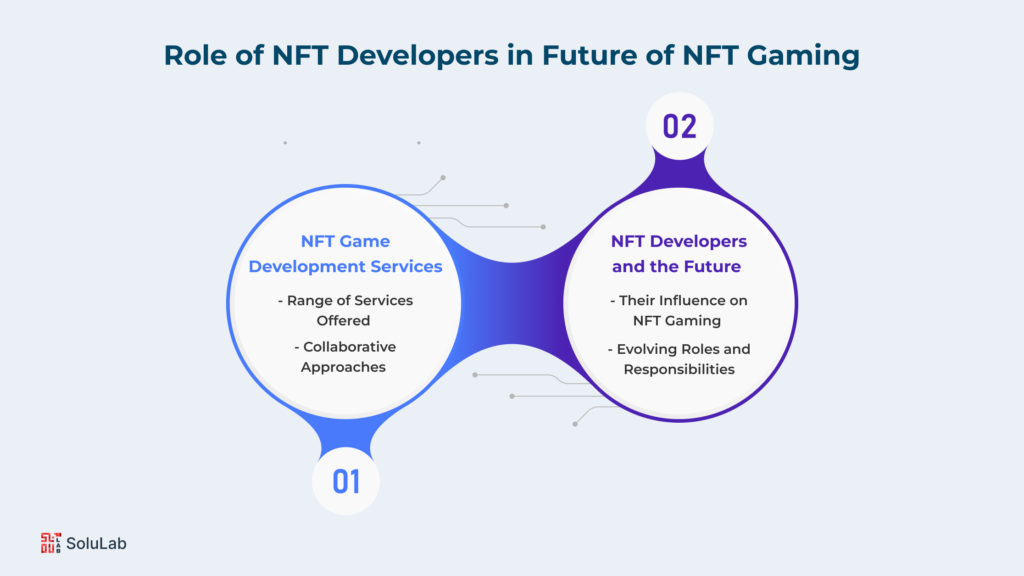
NFTs, or Non-Fungible Tokens, have rapidly become a transformative force within the gaming industry, particularly in the realm of NFT gaming collectibles. To harness the full potential of this technology, the role of NFT developers is pivotal. SoluLab, a prominent player in the NFT game development arena, is at the forefront of this exciting revolution. Let’s delve into the role of NFT developers, their qualities, services, and the impact they have on the future of NFT gaming.
1. NFT Game Development Services
-
Range of Services Offered
SoluLab, like other top NFT development firms, offers a comprehensive range of services. This includes NFT smart contract development, NFT marketplace creation, and the integration of NFTs into existing or new games. They also provide consultation on NFT strategies, tokenomics, and monetization methods specific to NFT gaming.
-
Collaborative Approaches
NFT game development is a collaborative endeavor. Developers work closely with game designers, artists, and publishers to create NFT gaming collectibles that resonate with players. SoluLab’s collaborative approach ensures that NFTs align with the overall game concept, enhancing player engagement and retention.
Related: Leverage NFT Technology to Foster Trust in Your Digital Identity
2. NFT Developers and the Future
-
Their Influence on NFT Gaming
NFT developers play a pivotal role in shaping the future of NFT gaming. Their innovative solutions drive the expansion of NFTs beyond collectibles. They enable in-game assets, skins, characters, and more to become NFTs, fundamentally changing the way gamers perceive ownership and trade.
-
Evolving Roles and Responsibilities
As the NFT gaming landscape evolves, so do the roles and responsibilities of NFT developers. They are increasingly involved in addressing scalability challenges, sustainability concerns, and adapting to regulatory changes. Their ability to provide solutions in these areas is instrumental in maintaining the growth and legitimacy of NFT gaming.
Conclusion
In conclusion, SoluLab stands at the forefront of the revolution in NFTs in gaming, shaping the future of virtual collectibles. As the world increasingly embraces Non-Fungible Tokens (NFTs) and their potential in the gaming industry, SoluLab’s expertise in NFT game development services and solutions is nothing short of visionary. Their commitment to excellence and innovation has led to the creation of immersive NFT games that redefine the way we perceive NFT gaming collectibles.
NFTs in gaming are not just digital assets; they represent a profound shift in how gamers interact with and own in-game items. SoluLab’s dedication to pushing the boundaries of NFT gaming has not only defined what NFT games are but has also unveiled the true meaning of NFT gaming.
By offering the opportunity to hire top NFT developers, SoluLab empowers businesses and individuals alike to enter the exciting world of NFTs in gaming confidently. In doing so, they are unlocking a future where virtual collectibles are not only a form of entertainment but a groundbreaking form of ownership, trade, and self-expression.
In a world where NFT gaming is rapidly evolving, SoluLab is the trusted partner you need to navigate this transformative landscape successfully. With their NFT game development expertise, they are helping shape the future of gaming, one non-fungible token at a time. For expert support, contact SoluLab today.
FAQs
1. What are NFTs in gaming?
NFTs in gaming refer to Non-Fungible Tokens, unique digital assets that are used within video games as collectibles, items, or characters. These tokens are blockchain-based and represent ownership of in-game assets.
2. How do NFTs work in gaming?
NFTs work by utilizing blockchain technology to create verifiable and unique digital assets that can be bought, sold, and traded by gamers. Each NFT has a distinct value and can be owned by individual players.
3. What is the significance of NFT gaming collectibles?
NFT gaming collectibles hold value because they are scarce and cannot be replicated. Gamers can buy, sell, or trade these collectibles, fostering a sense of ownership and uniqueness in virtual worlds.
4. Can you explain NFT game development?
NFT game development is the process of creating video games that integrate NFTs as in-game assets or collectibles. This includes designing, coding, and implementing NFT functionality within a game.
5. What services do NFT game development solutions offer?
NFT game development services provide comprehensive solutions for creating blockchain-based games. They include NFT asset creation, smart contract development, integration with NFT marketplaces, and more.




